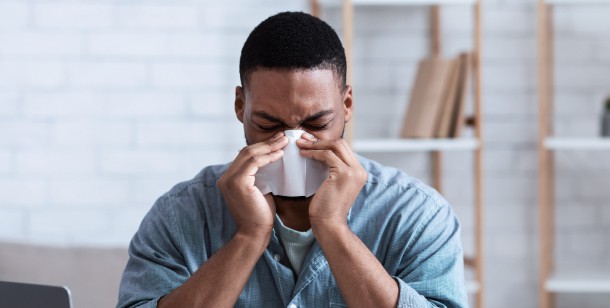The weather is changing, here in the United States! With those changes come the sneezes, sniffles, and sore throats of cold and flu season. If you’ve found yourself wondering, “Can climate change cause a sore throat, or other cold symptoms?” then you’re in the right place. Here we will explain just how the changing of seasons and the onset of cold weather can trigger respiratory illness.

Can Weather Change Give You a Sore Throat?
Yes, changes in weather can cause you to come down with a sore throat. There are many factors at work in this process that play a part in the onset of illness. Each season throughout the year lasts roughly three months; during this time, our bodies adjust to functioning in the predominant seasonal climate; meaning they adapt to being warm in summer, cold in winter, and so on.
When the seasons begin to change and a new predominant climate sets in, our bodies begin the process of readjusting to the new status quo. Sometimes, our bodies have trouble adjusting to the new weather. This internal struggle can trigger illness.
Additionally, the change to cold temperatures contributes to a weakening in our immune system, giving the seasonal flu virus and common cold a chance to find a foothold in our bodies. While sore throat is a primary symptom of cold weather illnesses, you may also experience some of the following:
- Runny Nose
- Cough
- Congestion
- Sneezing
- Soreness
- Chills
- Fatigue
- Fever
These symptoms can be signs of various cold weather illnesses, such as:
- Common Cold
- Flu
- Acute Bronchitis
- Chronic Bronchitis
- Laryngitis
or
- Pneumonia
Including a few healthy practices, like washing your hands frequently, in your everyday lifestyle can help you avoid falling ill during the winter. To learn more about avoiding the hazards of flu season, check out this article!

How Do I Treat A Sore Throat?
Luckily, there are many ways to treat a sore throat! If you’re suffering from a sore throat, try the following to help remedy the situation:
Gargle Salt Water – Gargling salt water can help soothe the throat and break down mucus.
Drink Hot Tea – Different types of hot tea come with properties that fight against inflammation and can act as antioxidants.
Suck on a Lozenge – Medicated lozenges can soothe sore throats as they melt.
Use a Humidifier – Adding moisture into the air of your home can help alleviate a sore throat.
Get Plenty of Rest and Stay Hydrated – Your body needs to be on top of it’s game to help you fight off illnesses. That’s why getting plenty of rest and staying hydrated is of key importance when recovering from sickness.
Over-the-Counter Options – When at home remedies aren’t cutting it, you can find relief in over-the-counter medicines like cough syrups or throat-numbing sprays.

What Environmental Factors Cause Sore Throat?
As with most things in life, the environment we’re in can play a huge role in our health. During the change to winter, cold air is an environmental favor that can cause flare ups in both asthma and bronchitis. Additionally, the change in seasons brings new seasonal allergies like pollen, dust, and more, along with it. To learn more about seasonal allergies in Texas, read on here!

Can You Get Sick From Climate Change?
So, can climate change cause a sore throat? Yes, changes in the weather can cause sore throats and other various respiratory illnesses that come with an uncomfortable list of symptoms. Luckily, all of these illnesses are easily managed, in non-severe cases, with a little at-home TLC.
Does COVID-19 Start With a Sore Throat?
While early COVID-19 symptoms can manifest differently for each individual, the most common symptoms include: fatigue, sore throat, fever, headache, or a loss of taste and smell. So yes, a sore throat can be an early sign of COVID-19. If you or a loved one is experiencing these symptoms, or has been exposed to someone diagnosed with COVID-19, get tested immediately and follow physician recommendations upon diagnosis.
Get Treated at Village Emergency Centers
If you have a sore throat, don’t panic! Very often, this uncomfortable condition only lasts three to 10 days and can be treated with at home care methods. However, if you begin to experience trouble or pain when breathing, trouble swallowing, difficulty opening your mouth, or earache you may be experiencing something more severe. In the event of severe symptoms, go to the emergency care facility nearest you to receive treatment.
